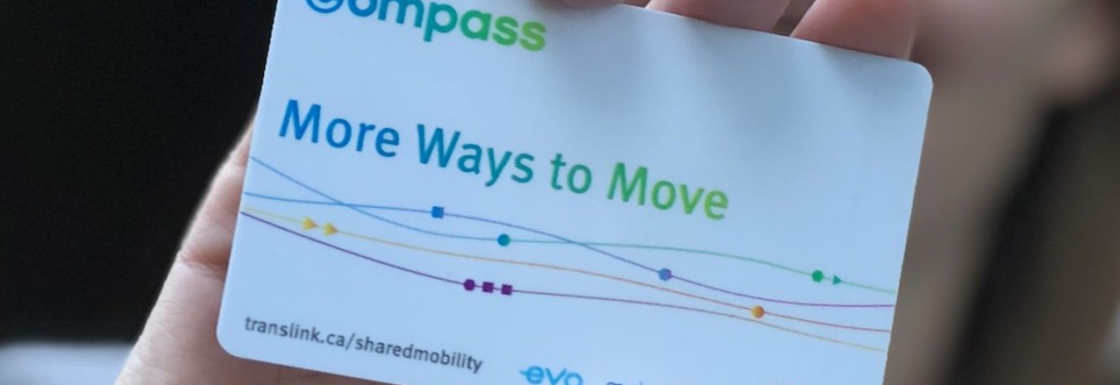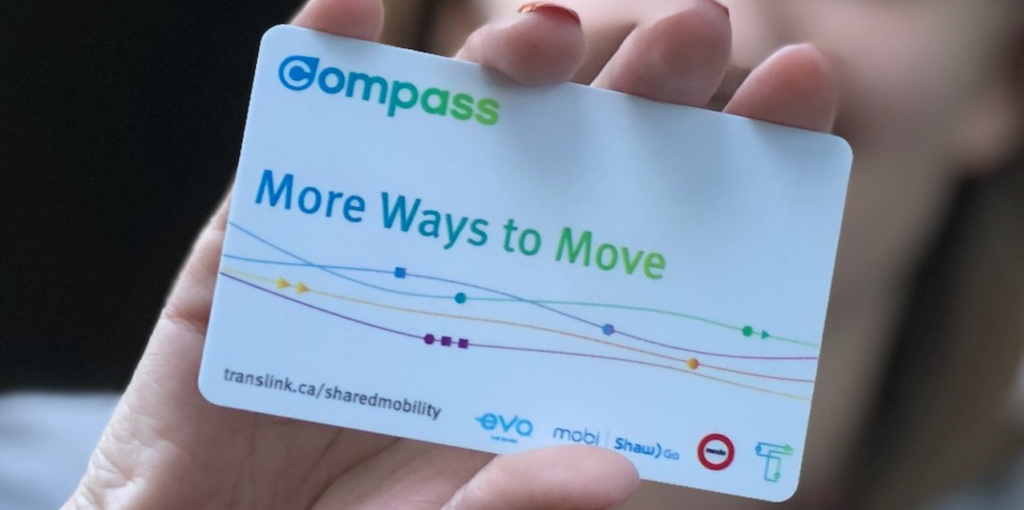Shared Mobility Compass Card: TransLink, movmi, Modo Co-operative, Evo Car Share, Mobi by ShawGo

Projects Sponsor
The Shared Mobility Compass Card program was designed to create more reliable, seamless and affordable mobility options in order to shift transportation behaviour away from single occupancy vehicles. In October 2019 TransLink, in collaboration with modo Co-operative, Evo Carshare, Mobi by ShawGo and movmi, launched a pilot targeting work related trips. As a result over 60% of participants shifted their behaviour and are using public transit, carshare or bikeshare instead of their personal vehicle. Additionally, over a third of participants have tried a new transportation alternative and over a quarter have started to combine different methods).

At the end of the day, or in the early morning rush hour, the main objective of any Mobility as a Service (MaaS) initiative is to provide more seamless transportation services so residents are freed from having to rely on their own personal vehicle. Improving the quality and perceived reliability of the entire alternative transportation ecosystem, shifts behaviour towards more sustainable modes.
That’s the future of the Shared Mobility Compass Card––a mobility as a service (or MaaS) initiative that ties public transit, carshare and bikeshare together––promises.
The project came out of the 2018 Open Innovation Call launched by TransLink’s New Mobility Group. Three different local providers submitted an idea around MaaS and the team grouped them together. They then conducted two consumer surveys, one focused on b2b and one on business-to-consumer (b2c) to help them better understand current mobility challenges and to determine MaaS preferences for each group.
The results were used to narrow down the pilot program user group––their product was tailored towards b2b customers––but also to determine which of the features they should focus their efforts on. For example, while creating a more streamlined and affordable transit experience remained their core objective, a subgoal was to create one simple invoice for companies instead of receiving individual expense receipts for their work-related trips.
The team conducted a technical feasibility study, created and tested a proof of concept and then launched the program to thirteen employers in Metro Vancouver in October 2019.
There were certainly road bumps along the way. Each of the transportation providers operates differently and the group had to find a way to collaborate effectively.
There were also technological limitations: the fact that TransLink does not have an account-based system. Instead, they have an RFID card system, meant having to find a solution that would incorporate the card and create a technology lite MaaS system but all these efforts bore fruit.
By using innovative technology to bring four local shared transport services together, the Shared Mobility Compass Card vastly simplified the user’s travel experience. Gone are the days of registering with different services, instead a single public transit card provided convenient access to all for all four modes of transportation.
As a result, over 60% of participants shifted their behaviour and started using public transit, carshare or bikeshare instead of their personal vehicle for work related travel. Additionally, more than a third of participants have tried a transportation alternative and over a quarter have started to combine different modes.
It’s also worth noting that this project and partnership is unique in Canada, putting Vancouver in the company of European MaaS leaders like Berlin, Munich, Madrid, and Vienna. This project can be used as a lighthouse project for other Canadian municipalities that would like to start a MaaS initiative, offering all of Canada a smoother, greener, ride.













